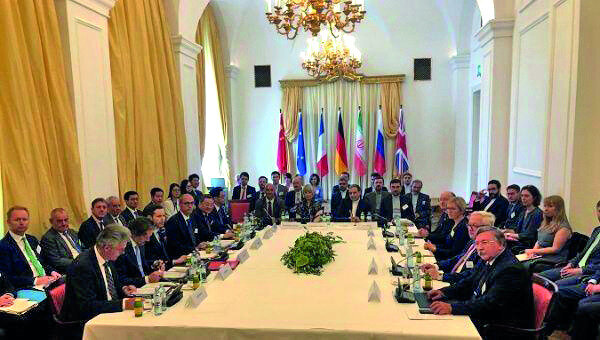Atlantic Council: A compartmentalized approach at the talks

TEHRAN- While the Biden administration explores ways to reengage Iran over its nuclear program, the Atlantic Council, has shed light on the issue from various aspects.
In this regard, on Feb 25, the think tank released a piece of opinion penned by Mehran Haghirian titled "With Iran, nuclear diplomacy comes first.”
The article argues that, notwithstanding the bitter experience of dealing with the Americans in terms of its nuclear program, now Tehran seems willing to reengage the U.S. on the issue. Therefore, “it is past time that the Biden foreign policy team implements what they have been preaching and reaches out to Iran in a
constructive manner.”
Grand bargain: A path doomed to fail
The analyst points out that some in Washington have been arguing for concluding a new deal that encompasses nuclear, regional, and bilateral U.S.-Iran issues as a whole pack. In this regard, he quotes Secretary of State Tony Blinken, who in an interview with NPR on February 16, said if both Iran and the U.S return to compliance under the JCPOA, “we need to work on an agreement that's longer and stronger than the original one.”
Blinken also stressed that the U.S. would require to engage “Iran's ballistic missile program” and what he called Iran’s “destabilizing actions in country after country.”
Haghirian believes that Iran does not intend to renegotiate the JCPOA framework and does not want any other topics to be included in the 2015 deal, either. He argues that if it were so, Tehran would have made such a move under harsh sanctions of the “maximum pressure” campaign during the last four years.
It is worth mentioning that just a day after Trump’s withdrawal from the JCPOA, Robert Einhorn, a nonproliferation expert at the Brookings Institute, told Reuters: “For quite some time, and I am talking about years, Iran will resist any kind of negotiation on a new deal.”
2015 deal: Based on realistic perceptions
The Atlantic Council believes that the JCPOA was achieved due to the realistic framework that all parties worked to resolve the dispute.
In this context, the author cites Blinken as the deputy secretary of state under the Obama administration in 2017. On September 21, 2017, in an interview with NPR, he stated: “The only issue that our partners were prepared to negotiate, was the nuclear program. Had we got engaged in a negotiation trying to bring everything on the table with Iran into the negotiation, we never would have gotten anywhere.”
In parallel, in an event held by Woodrow Wilson Center on March 22, 2017, Catherine Ashton, former High Representative of the EU for Foreign Affairs and coordinator of the nuclear negotiations, expressed similar remarks. She argued that the regional countries “did not wish us to start engaging in broader questions that affected them and not the people in the [negotiating] room.”
Against the backdrop, the Atlantic Council underlines that pushing for an expanded framework may just breed further mistrust and end up the U.S. and Iran in a worse place than the starting point.
Compartmentalize issues with Iran
Thereupon, the think tank proposes some recommendations for the Biden administration. It highlights that, in collaboration with five permanent members of the UN Security Council plus Germany, the Oval Office should address bilateral, regional, and nuclear issues with Iran via a compartmentalized approach. The author also underscores: “Any modification of the JCPOA should only be about the nuclear issue and in exchange for removing more sanctions.”
The Atlantic Council suggests that in parallel with nuclear talks, regional issues and Iran-U.S. bilateral concerns can be pursued in other forums, but for the process to be sustainable, essentially the U.S. and Iran should return to full compliance
with the JCPOA.
Regional actors for regional Issues
The analyst believes that Iran’s regional activities should not be excluded from negotiations at all but the relevant parties via proportionate mechanism should be included. The Atlantic Council emphasizes: “Iran’s regional actions must be negotiated with regional actors” and recommends the U.S. and other world powers to work with the UN secretary-general to facilitate a dialogue among Iran, the GCC, and Iraq.
Make bold moves but verify, verify, verify
With plenty of Obama’s key nuclear negotiators already at the White House, the Atlantic Council mentions that Biden’s foreign policy team enjoys many fellows who are fully aware of how valuable the agreement is. On the other hand, these old handed negotiators are very clear-eyed on the best ways of approaching Iran. Thus, there exists enough incentive “to make bold moves while remaining in the framework of ‘don’t trust and verify.”
JCPOA: An iterative process
To underline the importance of reviving the JCPOA before delving into other matters, the author cites current CIA director William Burns in October 2019 who helped lead the back-channel talks with Iran that led to an interim nuclear agreement in November 2013 and set the stage for the JCPOA in 2015. On Oct. 14, 2019, in a New York Times op-ed, Burns wrote: “The nuclear deal agreed to in 2015 was meant to be the beginning, not the end, of diplomacy with Iran.”
He stresses that to the American side, the JCPOA is an iterative one in which one agreement becomes a foundation stone for further negotiations.
Ronald Reagan invoked “trust, but verify” during disarmament negotiations with the former Soviet Union. Ernest J. Moniz, the U.S. Secretary of Energy under President Obama, mentioned that in the JCPOA talks their North Star was “don’t trust, and verify, verify, verify.”
Now, it is obvious that for the Biden administration in any future talks with Iran, the North Star will remain identical and this is up to the other parties to fix their compasses not to lose their interests.
